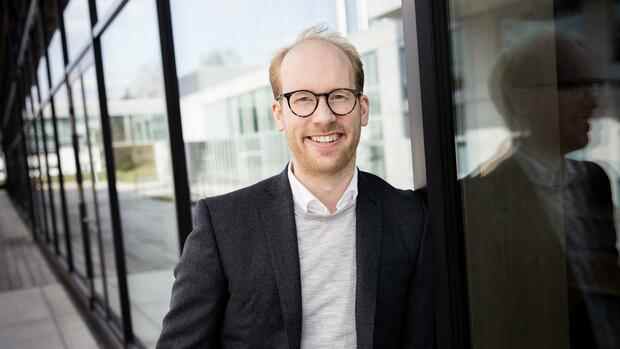Dusseldorf The family company Viessmann is planning a “historic investment” in air conditioning solutions and heat pumps: In the next three years, one billion euros will flow into research and development as well as into production capacities, as the Handelsblatt learned in advance. The company wants to expand production capacities as well as research and development.
“Unprecedented geopolitical developments require unprecedented responses,” said Max Viessmann, CEO of the Viessmann Group. More speed and pragmatism are needed to combat climate change and to rethink the generation and use of energy in the future “and thus strengthen Europe’s geopolitical independence”.
The energy transition has become more urgent as a result of Russia’s invasion of Ukraine. Since the invasion, Germany has reduced its dependence on Russian energy sources. However, 35 percent of the gas still comes from Russia, as Federal Economics Minister Robert Habeck (Greens) said at the weekend. Concerns about a delivery stop are high in the economy.
Viessmann has been marketing products for an energy transition in the building sector for a long time. According to the company with 13,000 employees, the proportion of heat pumps will have increased by 41 percent in 2021, which also presents the business figures for the past year.
Top jobs of the day
Find the best jobs now and
be notified by email.
Accordingly, sales increased by 21 percent to 3.4 billion euros compared to the previous year. For comparison: According to the Federal Association of the German Heating Industry, the entire heating market grew by ten percent in 2021. According to the association, the demand for renewable energies grew particularly strongly. Sales of pellet heating systems grew by 51 percent and heat pumps by 28 percent.
Craftsman shortages
However, the 105-year-old family business has not only grown organically, but also through acquisitions and investments in Australia, Great Britain, Poland and the Netherlands, where Viessmann acquired a stake in Priva, a leading company for building automation and vertical farming.
Max Viessmann was one of the few family entrepreneurs to speak at the climate summit in Glasgow in October 2021. The problem that concerns the entrepreneur: The building sector causes around 30 percent of carbon dioxide emissions worldwide and also in this country. In 2021, the German building sector also missed its climate target by two million tons of CO2.
Viessmann already saw a need for action back then: “Every day without solutions is at the expense of our CO2 balance sheet.” Around 85 percent of the buildings in Germany have only been partially renovated or not renovated at all. At this rate, “it doesn’t take long to understand that carbon neutrality is a challenge in 2045.”
>> Read here: The business talk with Max Viessmann: “The energy transition is suffering from too many ideological discussions”
Economics Minister Habeck is planning that four to six million additional heat pumps will be installed in Germany by 2030, also with state support. In order to achieve this goal, an average of 500,000 heat pumps would have to be installed each year. In 2021, however, it is estimated that there will only be around 150,000 to 170,000 in this country.
A significant increase is considered difficult in the industry because there are bottlenecks in the components. In addition, craftsmen are scarce: Michael Hilpert, President of the Central Association for Sanitary, Heating and Air Conditioning (ZVSHK), speaks of a lack of 60,000 fitters. This gap cannot be closed in the short term, especially since, according to association estimates, only around a third of heating contractors are currently able to install heat pumps at all.
Viessmann manufactures heat pumps instead of gas heaters
In Dresden, Viessmann is currently building a development center just for heat pumps. In addition, the production capacities of the company, which is headquartered in Allendorf in Hesse, are being expanded. Where gas wall units are still being manufactured, heat pumps are also to be built using a modular design.
In addition to EBM-Pabst, Viessmann was also a founding member of the climate protection company, a cross-industry initiative of companies that want to achieve ambitious climate goals. 50 companies are currently involved in the initiative.
Since 1990, Viessmann has reduced its own CO2 emissions by 90 percent. Emissions are to be halved again by 2030, and Germany wants to be zero by 2045. Viessmann also recently received official confirmation from the recognized “Science Based Targets” initiative (SBTi) for its goals for reducing its own CO2 footprint along the entire value chain.
Viessmann is investing in heat pumps – a new generation should also work without underfloor heating.
The SBTi certification confirms that Viessmann’s sustainability and climate strategy makes a positive contribution to the overriding goal of limiting global warming to 1.5 degrees in accordance with the Paris Agreement.
The fact that geopolitics is more present in the Viessmann family and its employees than in some other companies shows the enormous willingness to donate. More than 1.2 million euros were collected in total, transport and aid deliveries, accommodation and medicines were organized.
The reason: the building in the Ukrainian capital of Kyiv, in which Viessmann was housed with a sales and logistics unit, was destroyed as a result of a Russian attack. The employees had previously been evacuated.
More: German family entrepreneurs active in Ukraine are worried about their employees and their families after the Russian attack. Now they talk about it
